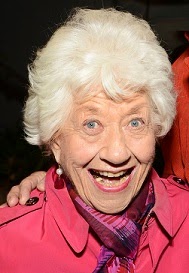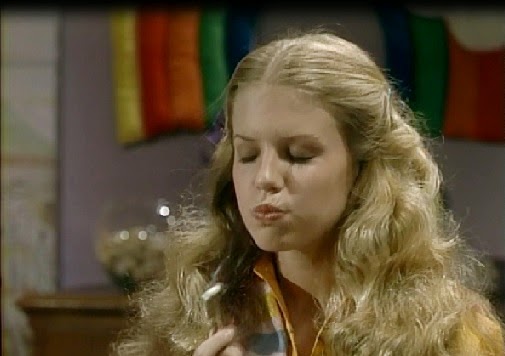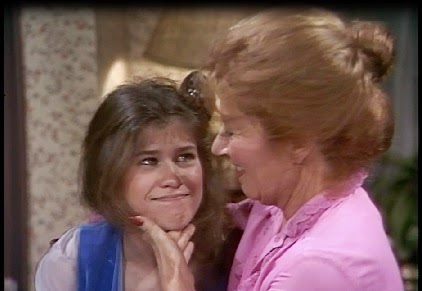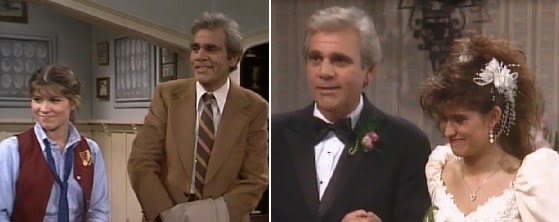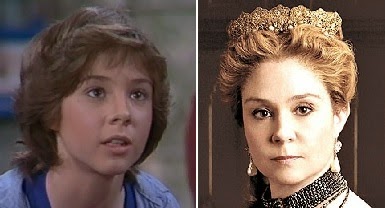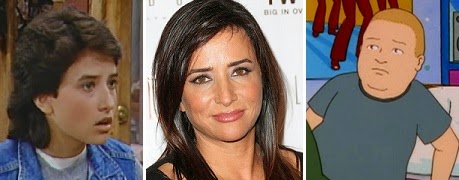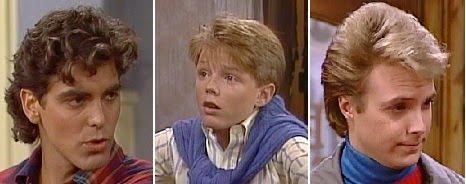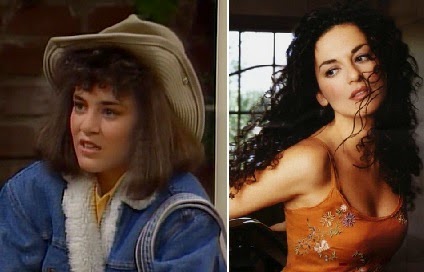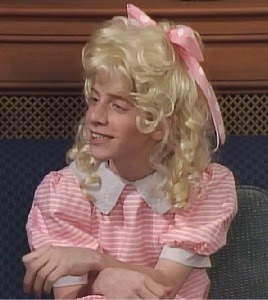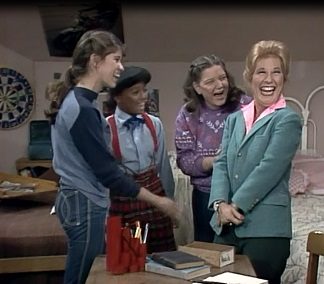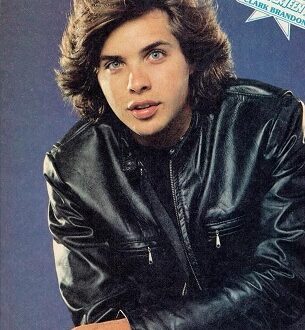
It’s the interview of my dreams! Except EW did it, not me
Many thanks to a Kiwi friend living in Australia, who pointed me to an Entertainment Weekly interview with many important Facts of Life personalities. Everyone from Blair to Mr. Bradley to Assad freaking Kelada talking behind-the-scenes and secret stories? Yes, please. And thank heavens they did it while Charlotte Rae is still alive. Sister be pushing 90. That’s one death I should probably start preparing for.
Sadly, the piece no longer seems to be online. In summary, it featured reflections from Nancy McKeon, Lisa Whelchel and Charlotte Rae, as well as some of the cut Season One girls (but not Molly Ringwald); several actors who had recurring parts (but not George Clooney); Assad Kelada; some writers; and even Alan Thicke (sitcom God of the 80s and co-writer of the iconic Facts theme song).
The interview didn’t provide too much in the way of factual information that I didn’t already know, but that’s not really what a thing like this is about. It’s much more fun to hear the reflections of those involved, that is, the things that aren’t objectively factual but which communicate so much more to a fan, or at least, to a graduate-level Facts fan like me, and it is those communications on which I have commented.
Correcting Alan Thicke: Alan Thicke is wrong when he asserts in the interview that you don’t ever hear the entire song in the show. In the first season, the entire song was indeed sung over the opening credits (with Charlotte Rae singing some key lines), and in some subsequent seasons, the lyrics that are cut in the opening credits are sung over the closing credits. Take THAT, Thicke! (P.S. Your son is a creep.)
This week, I thought I’d comment on the EW interview. If you haven’t already, I do recommend reading it; not only will it give you context, but there are some important bits in there that I know not everyone has committed to memory. Like I do.
When I tell people I write a Facts of Life blog, they usually say, something like, “Really? The TV show?” Keep in mind that as a student, I spend most of my time around people around a decade younger than me, and yet most of them have at least heard of the show, even if they can’t recall particulars off the top of their heads. With people around my age or a little older, they recall being very attached to it. And I think that comes through in some of the comments toward the beginning of the interview. Facts was HUGE. And FORMATIVE. For me and so many others, it wasn’t just a favorite show, it was part of our growing up. It sort of raised us.
Mindy Cohn’s story is a literal daydream. When I was a kid, I used to imagine that someone would show up and just think I was so awesome that they wanted to make me a star (I also used to imagine that Loverboy would drive by my Albuquerque house, hear me roller skating to their music in the back yard, and become my BFFs). Implausible, certainly. Yet that is what actually happened to Mindy Cohn. She was just a 13-year-old girl going to her private middle school, when The Powers that Be said, “we want you.” I’m sad that she didn’t want to talk about the show or reminisce at all, because I think her perspective is among the most interesting.
Do you think Julie knew the titles to those episodes off the top of her head? Either way, she either knew them, or she looked them up to get them right, which shows, I think, that she has a certain reverence for the show.
It’s funny to learn that the early writers of the show were all old dudes. It puts the episode “The Return of Mr. Garrett,” which is about Mrs. Garrett’s ex-husband showing up and teaching all the girls to gamble, in an excellent new light. You really can see the tenor of the show changing to being more girl-centric after the first four episodes. “Dieting,” which tackles body dysmorphia and eating disorders, is a classic. Somehow I’m not sure the old dudes would have been able to make that happen.
In general, I think the paring down of the girls from seven to four was a good move (though I suspect that viewer RJ Guy would disagree with me 🙂 ). I’m not sure I knew that the three they kept didn’t know about the cut. It must’ve been strange to show up for work and find out that more than half of your coworkers have been canned.
Executive producer Jerry Mayer interviewed that “it’s funny” that Molly Ringwald was one of the girls they decided to cut. If he had read my recap of the first episode, he would know that according to Molly herself in a 2010 interview with Advocate magazine, she was supposed to be one of the four girls they kept, but she got booted at the last minute for Nancy McKeon. I’m a Jo devotee, so of course I think that was a good move. Molly didn’t have the tomboy chops to be that kind of foil for Blair or that kind of gender-nonconforming and/or lesbian icon that Jo/Nancy was. Also, Nancy McKeon’s recollections about interacting with Charlotte Rae are just a delight to read. The two of them always did have outstanding chemistry on the show, and it’s a treat to hear that they both felt it right away.
Writer Sally Sussman Morina and John Lawlor, who played Mr. Bradley, recall that the girls grew up on camera, and this is a good time for me to have my semi-regular reflection on how great it is that exactly none of the girls suffered from child-star disaster syndrome (in stark contrast to their contemporaries on Diff’rent Strokes). I remember at the time all the tabloids constantly talking about their weight, particularly in the later seasons. I think I also remember Mindy Cohn once saying that she was made to wear unflattering clothes for a time because she was supposed to be “the fat one,” but she had lost weight and the other girls had gained. And yet through all this, none of them cracked. Even the first season girls that got cut didn’t end up on the front pages for addiction or arrest or Lohan-type shenanigans. Three of the four focal girls have stayed working actresses to this day, and Lisa Whelchel voluntarily dropped out of the spotlight for a time to do the wife and mother thing. I don’t think anyone in this interview gives them enough credit for this.
Hilariously, Lisa Whelchel chalks up the media obsession about the girls’ weight to the fact that there was nothing else to tabloid about, because there was no drama on the set to exploit. In other words, Lisa thinks that it’s not that they stayed well-adjusted in spite of the constant scrutiny, it’s that they got the constant scrutiny because they were so well-adjusted. Either way, it was some pretty magical casting.
I had great fun reading what Alex Rocco, who played Jo’s dad, had to say. One of the things I appreciate so much about the show is its consistency in casting; apart from a couple of blips (e.g., Blair’s mom in season one is not even close to Blair’s mom in subsequent seasons), the ancillary characters stayed consistent. Facts may have employed a number of tropes typically associated with jumping the shark (which is the subject of a forthcoming post), but not the same character-different actor one. Alex Rocco was indeed absolutely perfect as Jo’s dad, and it’s delightful to read that he speaks about it with such joy. He’s been a consistently employed actor. He even was the voice of Bea Arthur in an episode of Family Guy!
OK, how rad is Charlotte Rae for putting her foot down about a gay joke that the writers had put into a show? I often talk about how progressive the show was, and then when I recap the episodes I notice the rampant heteronormativity and ham-fisted messaging. But it’s little things like this that remind me that my gut feeling isn’t crazy.
Wrong recollection interlude
Pamela Adlon (she was Pamela Segall in Facts), who played Kelly Affinado, a potentially shark-jumping young character added in season five, recalls auditioning for a pilot called “Jo’s Cousin.” Though she’s right that the series didn’t go forward, she seems to imply that the series was scrapped prior to filming the pilot. Not true. They absolutely did film the pilot. It aired as the second-to-last episode of Facts season three. Megan Follows played the role of Jo’s cousin, after which she consistently worked. She’s been in episodes of Law & Order, Cold Case, and X-Files. If she gets a People’s Court appearance, she will have been on literally every single favorite show I’ve ever had.
But let’s talk about Pamela Segall Adlon a little more. That woman has an absolutely insane portfolio. She is stunning, and she has worked her butt off consistently since joining our intrepid little series as a 16-year-old in 1983. AND SHE WAS THE VOICE OF BOBBY HILL. I knew that a woman had voiced Bobby, but I had no idea it was a Facts alumna. That is so cool.
Pamela’s comment that she thinks Nancy McKeon never liked having her on the show is poignant and telling. It was this comment that gave away to me that the article is a transcription of parts of a series of interviews. I had noticed earlier that the transitions were somewhat clunky, but it still could be representative of a number of self-absorbed individuals in the same room. I seriously doubt however, that Pamela would have made this comment with Nancy in the room. If true, it might’ve been good for the series on the whole, since Jo and Kelly were meant to have tension. But it’s sad to think of Nancy being so ungracious after being accepted as a newcomer in season two.
Their comments about George Clooney are fun. It’s too bad they couldn’t get an interview from him too. Nancy’s comment that “it was hard for guys on the show in general” is astute, but I don’t know how much it matters. The show wasn’t about guys. Although I reject a gender binary in theory, I must acknowledge that it exists in our current culture and was even worse back then. At that time there wasn’t another show about young girls being young girls. The dudes were only there for support and window dressing.
I’ve been watching season eight lately, and the first thing I noticed when Cloris Leachman joined the cast is her superior acting chops. She is truly a gifted comedic actress, and it shows even in her goofy role as Beverly Ann. It saddened me to read that her joining the cast was less than perfect. The series did decline in the last couple of years, but I don’t blame Cloris for that. Nancy McKeon is right that the premise of the show got stretched a little thin in the later years – why were four adult women sharing a room across the hall from a middle-aged woman? And where was Andy sleeping all this time?
I get it, though. The girls had grown up with Charlotte Rae as a mother figure, so when she left it must’ve been hard on them. I’ve never had a stepparent, but from what I’ve read, I imagine that Cloris Leachman coming in at that point must’ve felt like a stepmother coming in and trying to take mom’s place. Of course the actresses were all grown women and professionals at this point, but y’know, you can’t fight viscera.
Sherrie Austin (Sherrie Krenn) at the time, was another potential shark-jumping move. Once again, we’re getting some younger cast members, and putting one in school at Eastland so we can try to recapture the magic. The whole Australia thing was pretty contrived, and I never really developed a connection to the Pippa character, but I didn’t hate her. And Sherrie herself has done pretty well as a country singer. Apparently she opened up for Johnny Cash in Australia at age 14. That’s pretty bad ass. I never opened up for Johnny Cash.
As the interview wrapped up, it was great to hear from Seth Green and Mayim Bialik, two actors who have loads of credibility and work right now. They are about my age, and they were fans when I was. I can only imagine what it would have been like to all of a sudden be on the show that raised you. It’s wonderful to know they, too, look back on their Facts experience with joy. If the spin-off series featuring Blair as Eastland headmistress and Seth, Mayim, and Juliette Lewis among Eastland’s students had happened, I certainly would have watched it. Who knows what would have happened to the actors. Regarding Seth’s other interview revelation, well, let’s just say I choose not to think about the implications of 21-year-old Mindy Cohn flashing a 14-year-old Seth Green.
I was quite disappointed to read that Kim Fields and Mindy Cohn are basically declaring that they have nothing more to say about Facts. There goes my dream of getting an interview with Kim to talk about her magical disappearing braces.
But the participating parties are right in their concluding remarks. Facts was so important, and it will permanently remain in the consciousness of those of us whom it raised. That’s why I’m here writing this blog, after all. And maybe why you are reading it.


